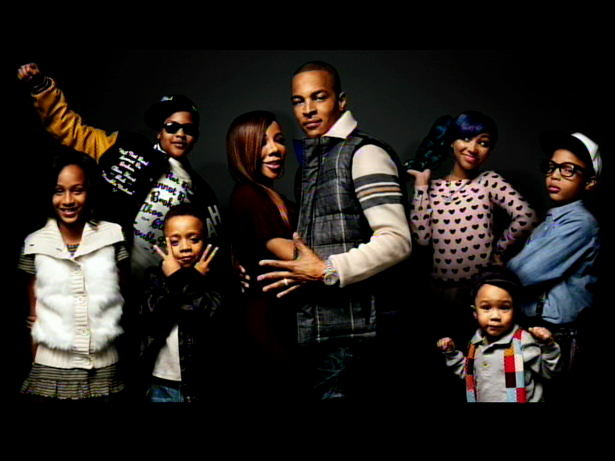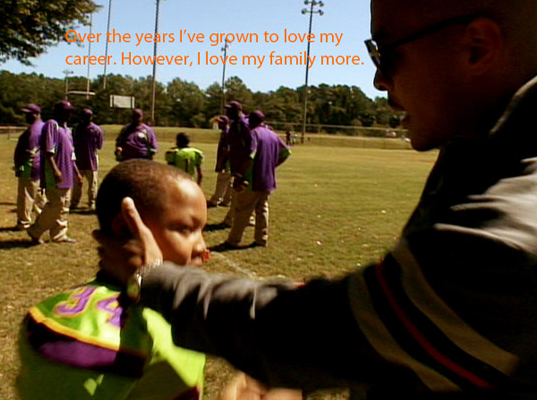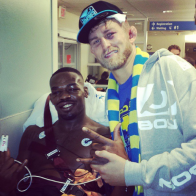 This past Monday was a great day for folks who watch reality shows. First, in the heavily scripted Love & Hip-Hop, Harlem-rapper Jim Jones showed his sensitive side, expressing his love for his long-suffering “fiancé” and concern over his mother’s meddling ways. Then, in next hour of programming, came the re-branding of Atlanta rapper, T.I..
This past Monday was a great day for folks who watch reality shows. First, in the heavily scripted Love & Hip-Hop, Harlem-rapper Jim Jones showed his sensitive side, expressing his love for his long-suffering “fiancé” and concern over his mother’s meddling ways. Then, in next hour of programming, came the re-branding of Atlanta rapper, T.I..
T.I. undoubtedly won over VH1’s audiences with his reality-doc, TI & Tiny: A Family Hustle, which showed, among other things, the benevolent patriarch shun his work-related appointments to make time for his children and wife, Tameka “Tiny” Cottle-Harris. But as much as people want to believe in T.I., which is understandable and highly warrantable, there are dysfunctions that permeate throughout the redemption-themed half-hour show.
First, without getting too deep or “nit-pickity,” the only reason T.I. continues to need this show — and his previous reality shows televised on Viacom’s family of music networks, BET and MTV, respectively — is he continues to make terrible decisions for his family even though, and again understandably, he claims most of his decisions are borne out the fear of clear and present dangers, resulting from the murder of his best friend Philant Johnson.
But the real “crime” of the show — which, I must say, is no fault of his own, considering T.I. may not be well-versed of its medical repercussions — is that two of his sons play football.
 Oh no, some may say, what’s wrong with kids playing football? Many men who play professional and collegially exclaim proudly about how much football teaches young boys structure, discipline, sportsmanship, and teamwork. And they are right! Those are all great virtues that football can teach youngsters but they can learn those same qualities on a science team or family camping trip.
Oh no, some may say, what’s wrong with kids playing football? Many men who play professional and collegially exclaim proudly about how much football teaches young boys structure, discipline, sportsmanship, and teamwork. And they are right! Those are all great virtues that football can teach youngsters but they can learn those same qualities on a science team or family camping trip.
Furthermore, many people might say that football helps young and adolescent boys release their aggression in a controlled medium, keeping the violence between the hashes and off schoolyards and out of neighborhoods.
All this is great, but all these positive effects of football pale in comparison to very real threat of concussions.
According to a new report, children who sustain head trauma feel the effects of the trauma years later and much longer than they will with bodily trauma.
Although this news is not surprising, especially since everyone understands that children’s minds are still developing, the research highlights the lack of tools in place to deal with head injuries.
“Right now we have no studies to guide the treatment of post-traumatic headaches in children,” said Karen Barlow at Alberta Children’s Hospital in Calgary, Canada, who was not involved in the new study.
The scariest and most troubling detail of the report is the ways in which young boys will conceal the nature of their injury in comparison to young girls. Admittedly, researchers are not for certain why young girls report having more headaches than boys, but they claim that it may have to do with how girls brains develop, citing hormones and the nature of girl’s injuries may lead to more headaches.
Football culture, in particular, rewards young boys for gladiator efforts on the gridiron, which comes with internalizing destructive and unhealthy behaviors of “shaking off” big hits and sacrificing one’s body for good of the team.
Even though on the professional levels, the National Football League takes punitive action against overly aggressive play, and now forcibly removes players that exhibit concussive symptoms, the culture forces and honors players who “man-up,” minimizing concussions and other head injuries in order to prove their masculinity.
And as young kids continue to play little league football in front of betting crowds, the pressure to perform may keep youngsters from revealing their injuries.
We have to break football’s mythological narratives that help distort American masculinity. Our society can’t keep allowing young boys to grow up discarding their personal well-being in favor of the hustling.
No one is suggesting that T.I. is abusing his children by sending them to play football, but the violence inherent to tackle football requires extra attention paid to the signs of head trauma.
Because most children imitate adults in every fashion, it will always be very difficult to convince youngsters avoid sacrificing short-term, highly praised reward in favor of living a longer more fruitful lifestyle.
Therefore, it’s on the adults to lead by example and tell youngsters that it’s okay to reveal that they are hurt, hopefully avoiding bad decisions that come from disguising pain, which may lead to undesired, and in a some instances, fatal consequences.
Now that’s the way to have your family hustle smart.







I think this is a good article. I think it would be more effective without the to reference.
I stopped my child from playing football and put him in martial arts where he could release his aggression in a balanced way. The most important thing is that my son doesn’t take hits to his head. There was a report on Outside the lines on ESPN that said that small repeated blows to the head can lead to early dementia and ALS.
On the other hand I enjoyed T.I.’s show so … suck it
It never crossed my mind that football head injuries were that harmful to kids, But IMHO most parents would trade the fortune for their kids health and since it will take years sometimes for the symptoms to show up it will be hard to get boys off the field. It’s sad that money trumps every rational thought sometimes. Keep fighting for the kids
Like Jigga said “you can’t knock the hustle though” Everyone know football terrible for the body and even more for the soul. I mean hitting other humans with the intent to injure FOR MONEY can’t be right but Lord knows that we all do things for the dollar, the root ALL evil, that goes against humanity but WTF are we supposed to do… STARVE?
I’m just saying we can’t get on T.I. too hard but I agree he should educate himself to head injuries for the sake his sons but also talk about the NFL cuz they’re the ones marketing the sh!t to kids.
While football is a very physical game, it is far less dangerous than many other childhood activities. Children are more likely to receive a head injury from bicycling or skating than playing football. Just about any organized sport can teach structure, discipline, sportsmanship and teamwork, but when you put naturally aggressive kids on a science team you may get the next great weapon of mass destruction. Are we talking about how to best preserve the health of children here, or are we bashing football? If you really want to protect as many children as possible, don’t let them ride in cars. Heck, put them in a padded cell for the rest of their life, they’ll be good and safe there!
Football is not an outlet for aggression, it is a tool to harness, control and focus aggression. There is no place for unrestrained aggression in football and it is not tolerated. When a boy learns that he can control his impulses and in doing so he is rewarded, he is better able to cope with any adversity in life. Shrugging off pain is a rite of passage to the hero that lives in every young boy. To try to quantify it to some people is almost impossible, but the countless times firefighters, law enforcement officers and soldiers ignore their own pain to rescue someone is testament to this practice.
Football is absolutely not the game for every boy, but it is the perfect game for some. Find your boy’s game and I’ll find mine, but don’t knock a sport because you don’t like it. The game has changed dramatically since it began, and is one of the only sports that expect to have rule changes every year. My father played football and broke the legs of a lot of other players. The rules changed and you can no longer block that way, but my parents feared for my safety and put me in soccer. Being larger, faster, and more aggressive, I hurt a lot of other kids while still playing within the rules. My oldest plays football because I feared he would hurt smaller kids in soccer. My youngest started in soccer, but as he gained size and strength, I have moved him to football. If you are not sure about what sport your boy should play, ask the athletic director at their school.
Your articles’ intention is gallant, but your arguments lack weight. Don’t take it personally, rub some dirt on it and get back out there!